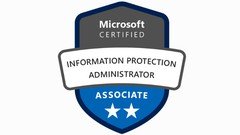Course Overview
The Administering Information Protection and Compliance in Microsoft 365 course is designed to equip learners with the skills needed to implement and manage information protection and compliance within the Microsoft 365 environment. Through this course, students will gain a deep understanding of information protection and governance, learning how to classify and protect data, manage sensitive information, and apply encryption across the suite. This course is instrumental for IT professionals seeking to enhance their expertise in securing corporate data and ensuring compliance with regulations, thus preparing them to effectively manage their organization’s information protection strategies.
Course Prerequisites
To ensure a successful learning experience in the Administering Information Protection and Compliance in Microsoft 365 course, participants should meet the following minimum prerequisites:
- Basic understanding of Microsoft 365 services and features.
- Familiarity with basic concepts of data governance, including data retention and data loss prevention.
- General knowledge of security best practices, particularly regarding information protection and data policies.
- Experience with managing users and groups in a Microsoft 365 or Office 365 environment.
- Some exposure to Windows 10 and a general comprehension of its functionality, as it relates to endpoint data protection.
- An understanding of basic IT concepts and terminology, such as encryption and authentication.
These prerequisites are designed to ensure that learners have a foundational knowledge base to build upon as they delve into the specific tools and strategies for information protection and compliance within Microsoft 365.
Learning Objectives – What you will Learn in this Administering Information Protection and Compliance in Microsoft 365?
Introduction to Learning Outcomes:
Gain proficiency in safeguarding data within Microsoft 365 by mastering information protection, data loss prevention, and governance, ensuring compliance with organizational policies and regulations.
Learning Objectives and Outcomes:
- Understand the principles of information protection and governance in Microsoft 365.
- Learn to classify and manage sensitive information types effectively.
- Grasp the fundamentals of Microsoft 365 encryption to secure data.
- Implement Office 365 message encryption to protect email communications.
- Configure and apply sensitivity labels to manage access to organizational data.
- Prevent data loss across Microsoft 365 services with comprehensive DLP strategies.
- Deploy Endpoint data loss prevention to protect data on devices.
- Set up DLP policies for monitoring and controlling information flow in Microsoft Cloud App Security and Power Platform.
- Manage data retention policies across Microsoft 365 workloads to comply with legal and regulatory standards.
- Administer records in Microsoft 365 to ensure proper preservation and disposition of critical business information.
Target Audiance
- IT Administrators
- Compliance Officers
- Data Protection Managers
- Security Managers
- Network Administrators
- Information Technology Specialists
- Systems Engineers
- Cybersecurity Analysts
- Risk Assessment Professionals
- Privacy OfficersPrivacy Officers
- Legal Consultants specializing in data compliance
- Microsoft 365 Certified: Security Administrators
- Enterprise Architects
- Governance, Risk, and Compliance (GRC) personnel




 4.8
4.8